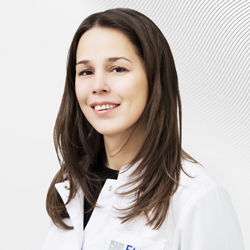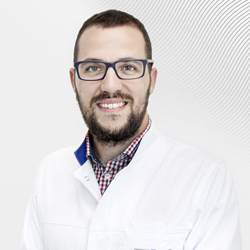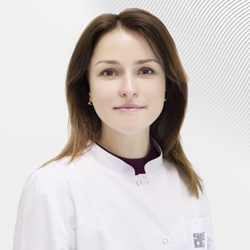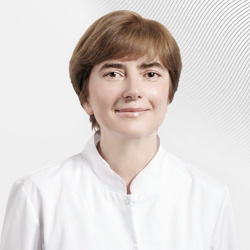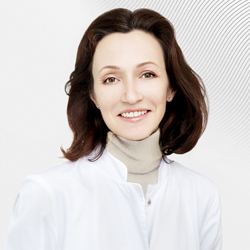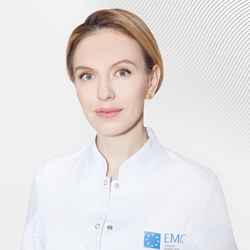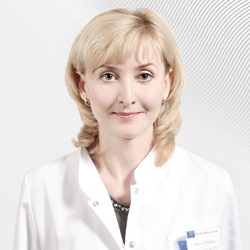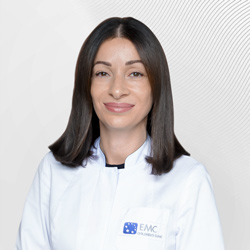Endocrinology is divided into:
-
Diabetology (diabetes and disruptions in glucose metabolism);
-
Thyroidology(thyroid diseases);
-
Reproductive Endocrinology (sex hormones, their function in the body, menopause and andropause) - EMC endocrinologists in this field of endocrinology work in close collaboration with gynecology and urology;
-
Pediatric Endocrinology (growth, maturation and sexual development);
-
A division dedicated to obesity and metabolism, which works closely with nutrition.
These divisions are the most known and understood, because obesity and diabetes are on the increase, and certain thyroid abnormalities are found in every third middle-aged person.
There are a few rarer but still very important divisions:
-
A division dedicated to tumors of the endocrine system. The endocrine glands are often the site of different kinds of nodes, tumors, or simply structural changes (heterogeneous hyperplasia). Very often, these tumors do not behave like most tumors in other body tissues. Endocrine tissue is, in general, very changeable. EMC endocrinologists work closely with specialists from the Oncology Institute and the Surgery Clinic.
-
Neuroendocrinology is a division dedicated to the pituitary hormones, which regulate all the other hormones. The pituitary gland is located in the center of the brain, hence the name neuro. In this division, endocrinologists at EMC work closely with neurosurgeons.
-
A division dedicated to the adrenals; small glands in the center of the body that support blood pressure, determine the balance of fluid and salt, as well as carry out the majority of stress reactions. It is here that the well-known adrenaline is produced.
Thus, distinguishing between endocrinology and other specialties is very difficult. At EMC you can find specialists who deal with all of the above narrow and mixed divisions of endocrinology.
WHO SHOULD CONTACT ENDOCRINOLOGIST FOR PREVENTIVE CARE:
-
People who are overweight;
-
Women planning to become pregnant;
-
Menopause-aged women and andropause-aged men;
-
Younger patients (under age 40) with high blood pressure;
-
People with a family history of diabetes or thyroid cancer;
-
Athletes: amateurs who want to improve training results, as well as those who use anabolic steroids.
Symptoms of endocrine diseases can be very different and non-specific. In many cases without testing it is impossible to determine whether or not a problem relates to endocrinology.
A number of situations exist when consultation with an endocrinologist is imperative:
-
Dry mouth, thirst, frequent urination (including at night), severe weakness and weight loss, itchy skin with no rash, furunculosis, recurrent infections;
-
Increased heart rate (palpitations), previously uncharacteristic anxiety, excessive sweating, weight loss, hand tremors, insomnia;
-
Apathy, reduced work capacity, drowsiness, constipation, swelling or pitting edema (traces from socks or shoes on the legs and feet, belts or other tight clothing, rings or watches on the hands), dry skin, brittle nails, hair loss and thinning hair,
-
Discomfort in the neck, a "lump in the throat" sensation, a visible formation on the front of the neck, a hoarse voice not related to a cold, difficulty in swallowing;
-
Pain in the lower third of the neck in the front, which is accompanied by an increase in temperature;
-
In women: disruption in menstrual cycle, acne and hair growth in "male" areas (hirsutism), infertility, the appearance of secretions from the breast outside of pregnancy, early cessation of menstruation (premature menopause);
-
In men: decreased libido and potency, sterility, breast enlargement, reduction of hair on the face and body;
-
sharp fluctuations in weight, the appearance of striae (stretch marks) on the skin.
THERE ALSO EXISTRARE, BUTHIGHLY SPECIFIC SYMPTOMS, WHICH REQUIREAN ENDOCRINOLOGY CONSULTATION:
-
Change in appearance (coarsening of facial features, thickening of fingers, increase in the size of the hands and feet, abnormal bite), excessive sweating, pain and reduced mobility of the joints;
-
Exophthalmia (protruding or bulging eyeballs);
-
Redistribution of subcutaneous fat: the appearance of round, red cheeks, a fat "hump" on the back of the neck, abdominal enlargement in setting of apparent weight loss in the arms and legs, thinning of the skin, easy bruising and broken blood vessels in the skin, the rapid appearance of stretch marks on the body; all this combined with high blood pressure and high blood sugar.
WE TREAT:
- Thyroid diseases:
-
Hypothyroidism and hyperthyroidism, thyroid hormone deficiency and excess;
-
Chronic autoimmune thyroiditis, subacute thyroiditis;
-
Nodular goiter and thyroid tumors;
-
Disorders of the thyroid gland during pregnancy.
- Parathyroid gland diseases:
-
Hypoparathyroidism (including postoperative);
-
Hyperparathyroidism;
-
Obesity and metabolic syndrome;
-
Diabetes types 1 and 2.
- Reproductive Endocrinology:
-
Hyperandrogenism in women, polycystic ovary syndrome;
-
Congenital adrenal hyperplasia (adrenogenital syndrome);
-
Hypogonadism, andropause in men, gynecomastia;
-
Infertility associated with hormonal disorders.
- Neuroendocrine disorders:
-
Pituitary adenoma (hormonally inactive, prolactinomas, etc.);
-
Non-tumor hyperprolactinemia;
-
Hypopituitarism (adrenal insufficiency, secondary hypothyroidism, hypogonadism);
-
Diabetes insipidus, which developed after a traumatic brain injury or neurosurgery;
-
Osteoporosis.
- Adrenal gland diseases:
-
Mass lesions in the adrenal glands (hormonally inactive, pheochromocytoma, aldosteroma and androgen-secreting tumors);
-
Hypertension that is endocrine in origin;
-
Adrenocortical insufficiency.
The department of endocrinology at EMC is part of a multi-functional hospital, where it is possible to perform laboratory and instrumental diagnostics, including densitometry (determination of bone mineral density) and impedance testing (body composition analysis and diagnosis of obesity). Thus, our patients have the opportunity to receive the entire spectrum of health care: from diagnostics to treatment (including surgical), follow-up and prophylaxis of endocrine disorders all within the same clinic. Diagnostics and treatment at EMC are conducted according to modern Western European and American protocols.

